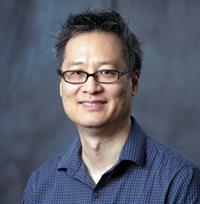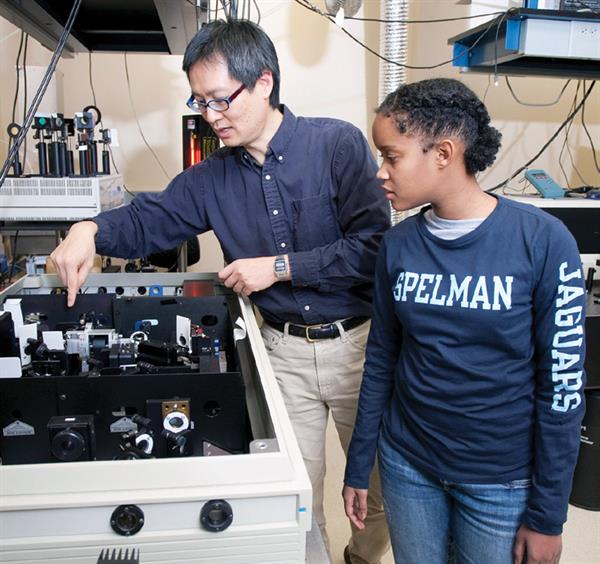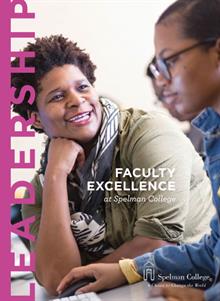 Peter Chen, Ph.D., is a chemist, so he tends to think in terms of compounds. However, when he's asked to describe the decisive ingredient in his success as a researcher, he offers a surprising response: LUCK.
Peter Chen, Ph.D., is a chemist, so he tends to think in terms of compounds. However, when he's asked to describe the decisive ingredient in his success as a researcher, he offers a surprising response: LUCK. “I do feel really, really lucky when I think about the number of times that we have made mistakes in the lab, and then we worked pretty hard to figure it out, and all of a sudden, we had a ‘Eureka!’ moment,” said Dr. Chen, a professor of chemistry in the Department of Chemistry and Biochemistry.
“So it looks like a lot of what we’ve done was deliberate and straightforward, but a lot has been due to a combination of luck, hard work and persistence.”
Conduct Groundbreaking Research
The chemist’s modest appraisal of his achievements isn’t shared by others in the scientific community. Dr. Chen has garnered praise – and a prestigious National Science Foundation Career Award – for his groundbreaking research in the field of laser spectroscopy. His leadership in the field, which is devoted to developing new ways of using lasers to study molecules, is all the more remarkable because it’s happening at Spelman. “There’s a large community of researchers in the emerging field of coherent multi-dimensional spectroscopy, which uses multiple laser beams to study molecules, but it’s almost exclusively happening at major research universities,” said Dr. Chen.
While the big graduate institutions have thrown scores of researchers and millions of dollars into coherent multidimensional spectroscopy, which Dr. Chen describes as a “hot area” of research, many undergraduate liberal arts schools are left on the sidelines and lack the resources needed to get into the game. This means smaller schools are being left out of exciting research and funding opportunities in an emerging field that could eventually help scientists tackle a wide range of problems in many different fields.
Were it not for Dr. Chen, Spelman also might have been left behind. However, he has used a two prong strategy -- being creative and making the most of what you have -- for securing research funding and making important breakthroughs in his field.
Be Creative and Resourceful
“I think the reason I’ve gotten funding is because the funders say, ‘These ideas may not be as fully developed as if they were coming from a research university, but they involve really creative and potentially transformative ideas, so let’s support this effort,” said Dr. Chen, who recently received a half-million dollar NSF grant to develop a new kind of coherent multidimensional technique that works in the infrared region. Most funders don’t expect smaller schools to pursue the kind of large-scale, cutting-edge research projects normally undertaken by major research institutions, Dr. Chen said. So, undergraduate liberal arts colleges like Spelman can improve their funding prospects by developing innovative, high impact, targeted projects that give the faculty member a unique niche in an important field.
 Dr. Chen also suggests that researchers at smaller schools should constructively assess and utilize their existing resources and areas of expertise identifying areas of interest. He observes that one of his biggest breakthroughs resulted from his use of older style lasers to develop new techniques.
Dr. Chen also suggests that researchers at smaller schools should constructively assess and utilize their existing resources and areas of expertise identifying areas of interest. He observes that one of his biggest breakthroughs resulted from his use of older style lasers to develop new techniques. “These days, a lot of people want to use newer femtosecond lasers to do laser spectroscopy. We decided to use traditional nanosecond laser systems, and it turns out that these older systems can be used to do things that the newer femtosecond laser systems have difficulty doing,” said Dr. Chen.
In fact, the clever utilization of that “old fashioned” laser by Dr. Chen, his research assistants and his students literally is pushing the science of spectroscopy into a whole new dimension.
“Many groups have figured out how to carry out two-dimensional spectroscopy, but there are very few that have demonstrated real applications of coherent three-dimensional laser spectroscopy. We’re one of the few groups that actually has done that because it turns out that it’s easy to do third dimensional work with our nanosecond laser systems,” said Dr. Chen.
“As a result, we’ve been able to sort of leapfrog and make considerable progress in the field of high resolution three-dimensional spectroscopy while other groups have struggled with phase stability requirements needed to make 3D spectroscopy work with femtosecond lasers.”

